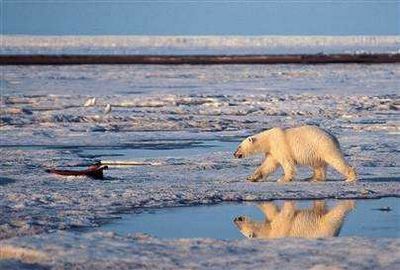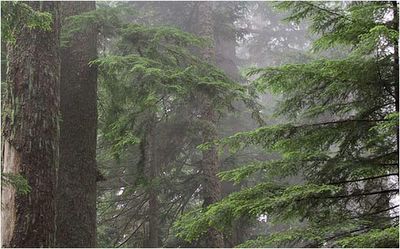Saturday, February 11, 2006
"Even the humblest, most industrious citizen is expected to be an ignorant fanatic, whose prevailing moods are fear, hatred, adulation, and triumph, regardless of his own suffering. In other words, the mentality appropriate to a state of war. And being at war, and therefore in danger, makes the handing over of all power to a small caste seem the natural, unavoidable condition of survival."
from a new dramatic version of George Orwell's Nineteen Eighty-Four quoted in an enlightening essay by Arriana Huffington.
The blogosphere, left and right, is in love with the concept of memes, which (embarrasingly enough for the right) was invented by evolutionary biologist Richard Dawkins, as a mental analogue to the gene.
The blogosphere works hard to make the meme theory real by replicating a vocabulary, which on the left includes always referring to "Bushco" or "Bush Co," and of course "the latest meme" (it's become a meme that the most successful meme in history is meme itself. FDR said that, I believe, or maybe Lincoln. ) And both blogging hands share such acronyms as MSM for mainstream media.
It doesn't take much science to figure out that the meme theory is bunk as biology. It's an analogy, a metaphor, two of the many concepts apparently sacrificed with cuts in literary education. It has some interesting application to the behavior of media and the evolving study of the web itself, with its viral analogies. But in discourse generally, we've got plenty of other words that are more precise, like cliche, slogan, stereotype and catch-phrase.
Which brings me to George Bush. Recent tendencies in the White House have led leaders in the southpaw blogosphere to routinely refer to "King George," or the analogy of Bush purporting to be King. But while the metaphor has merit, I don't think it's the best one.
I don't expect this argument to go very far, as the idea of "archetypes" doesn't cut much virtual mustard, even to those in love with "framing" (another dubiously applied concept.) But while there is historical justification for the king metaphor (suggested of course by "King George" of England during the American Revolution, the monarch George Washington didn't want to be), it's the wrong archetype.
Why? Because most of the deep associations of "king" are good. The longing for the good King's return is central to the Arthurian legend, the most potent archetypal story in England and its former colonies. Think Lord of the Rings and the Return of the King. Princess Leia. The idea of royal blood as a symbol for virtues of leadership, nobility and power. The king is the most potent archetype affecting politics, and its potency is in the power it has on deep and unconscious levels. It is at this point quite destructive, but that doesn't alter the fact that people feel it.
There is also a certain aptness in the analogy as this president is the son of a former one. The irony of the Bushes as a royal family is worth analysis, most appropriately formed as a lacerating extended satire. But that's its effective limit.
What Bush is threatening to be is a much more modern species: the dictator. The proper historical analogy is not King George but Adolf Hitler. He isn't setting up a monarchy as much as a totalitarian state. This is more accurate in terms of the modern state and its apparatus. And in terms of its ugliness. A lot of Germans didn't think Hitler was ugly at the time. They were enthralled, and then they were scared.
Or, if you like, it's not King George but George Orwell we should be thinking of, and comparing the Bushites to. Among the supporting arguments I would offer is the Arriana Huffington piece linked above.
Of course it's important to be consciously aware that the dictator evokes the king archetype, as the ruling plutocracy evoke the nobility. There's a lot of magical thinking below the modern facade, along with a primitive urge to follow the one who appears strongest in order to survive.
The love of kings and royalty in our time is also expressed as celebrity worship, and in a milder way of fawning over and imitating leaders, even in the blogospheres. That's fine, if there's a corresponding enthusiasm for creativity, and an ability to modify the "meme" as a result of argument rather than the endorsement of fashion leaders.
Friday, February 10, 2006

The polar bear is under serious consideration for classification
as a threatened species, because global heating is rapidly
destroying its Arctic habitat.

The Dreaming Up Daily Quote
Edward Albee
Captain Future's Log
We all know the multiple problems of a world dominated by large quantities of fast moving information.
There's information overload and its paradoxical companion, information addiction (leading perhaps to wanting to monitor everybody's every phone call, even when using that information well is dangerously improbable.)
There's the Goebbels-Rove industry of designing, manufacturing, amplifying and distributing alloy for your allies out of gross forms of information: half-truths, entire lies, obsfucations, deceptive oversimplifications and propaganda/spin.
And then there's the granddaddy of flaws in information: refusing to accept and act on it. This is a system's problem, and a challenge to democracy and self-government problem. Most creatures must act on information that threatens their survival --without doing an elaborate song and dance on the subject, how we deal with threat and opportunity is probably at the heart of our big brains. We're a self-aware social species, so it's not a simple matter. We've built systems to organize information and action, but those systems also create anomalies, like distance in time from cause to effect.
As a self-governing democracy of at least partially rational beings, we expect our leaders to fool around with information, to play politics with it, when there's no immediate large threat. But then when there is a threat to us all (or at least a lot of us) we expect them to take their brains to another level, and work together to do the job we chose them to do. We expect them above all to deal honestly with information.
Every day brings more examples of how they don't--examples that frankly scandalize those who remember the Eisenhower 1950s and Kennedy 1960s, let alone the 40s and 30s. A fitful deterioration since the Johnson years has come to this not very pretty picture of our present.
In today's news alone...
New York Times reports on former FEMA director Michael Brown's testimony that he informed the White House of flooding and a levee breach or overtop a full day before officials there admit having this information. Other evidence before a Senate committee indicates this information came from other sources as well, some of them public (as some of us remember.) Think Progress has a very useful Katrina timeline. This is criminal failure to use information to mitigate a disaster that cost thousands of lives, and will affect everyone in this nation for years to come.
In an article in Foreign Affairs widely reported today, a former CIA official who coordinated U.S. intelligence on the Middle East during the Iraq invasion, Paul Pillar, accused the White House of misusing prewar intelligence to justify its case for war.
"Official intelligence on Iraqi weapons programs was flawed but even with its flaws, it was not what led to the war," Pillar wrote."If the entire body of official intelligence analysis on Iraq had a policy implication, it was to avoid war -- or, if war was going to be launched, to prepare for a messy aftermath."
He also charged that the Senate intelligence committee and a presidential commission overlooked evidence that the Bush administration politicized the intelligence process to support White House policymakers.
Last but certainly not least, an ingenuously designed study described in the journal Science and reported by BBC News shows that the northern hemisphere of a planet you may have heard of was warmer at the end of the 20th century than in the previous 1,200 years. The findings support evidence pointing to unprecedented recent warming of the climate linked to greenhouse emissions.
Because the kinds of information in records on climate that scientists now use is relatively recent, researchers from the University of East Anglia in England used multiple other sources.
In addition to 14 sets of temperature records from various places in the northern hemisphere, they studied the rings of long-lived evergreen trees in Scandinavia, Siberia and the American Rockies. They looked at the chemical composition of ice in Greenland ice sheets which have become a key source for climate-related information in the deep past.
In addition to other natural indicators, they examined diaries written by human beings from the past 750 years, plus other written records.
A key test of their methods would be if they reflected periods of relative warmth and cold already established. They did. Their analysis confirmed the warmer years from AD 890 to 1170 known as the "Medieval Warm Period." They confirmed the much colder centuries from 1580 to 1850 called the "Little Ice Age."
They found that our time represents the most widespread temperature anomaly of any kind since the ninth century. "The last 100 years is more striking than either [the Medieval Warm Period or Little Ice Age]. It is a period of widespread warmth affecting nearly all the records that we analysed from the same time," co-author Timothy Osborn told the BBC.
There is now so much information leading to the same conclusion without our governments or our species doing much to use it that it becomes an oppressive and depressive and probably widespread feeling that we're going to ignore it until it's much too late to even mitigate the doom we daily create.
Thursday, February 09, 2006
One of the more articulate and persistent voices making the climate crisis relevant and personal has been Bill McKibben. He's the guy I first heard call for considering the Climate Crisis a moral issue, the most important moral issue since Civil Rights. He's also a terrific writer, very important in getting attention.
He had a nice short piece in Orion that's been republished in Sentient Times, a very useful and free publication (though it's pretty hard to tell one issue from another), and it's on the web here.
It begins: Can you feel the mood shifting? I can. A year of spiking speculation about peak oil and the death of suburbia has rattled lots of Americans. Plenty of people suddenly feel that real, civilization-shaking change might be around the next corner. And plenty of them also feel frozen in the headlights, unsure what, if anything, to do about it. Other than wait.
The Pew Center on Global Climate Change has issued a call and a plan for action now. In the Executive Summary, the Report outlines 15 steps that need to be taken now, to both cope with the inevitable effects of the Climate Crisis (Develop a national adaptation strategy through the Climate Change Science Program and Climate Change Technology Program, and fund development of early-warning systems for related threats) and to possibly forestall even more catastrophic heating and its effects in the future which threaten human civilization and life on earth as we know it.
In the Overview, the Report states: Meeting the challenge of global warming will require sustained effort over decades - on the part of governments, who must establish the rules and modify them as we learn more of the science, and as technological solutions begin to manifest themselves; on the part of industry, who must innovate, manufacture, and operate under a new paradigm where climate change will drive many decisions; and on the part of the public, who must also switch to a more climate-friendly path in their purchases and lifestyles.
A comprehensive action-oriented approach is a major contribution, as are the blend of economic, social and environmental considerations. The report assumes more significance because it comes from such a reputable source as Pew.
It's a policy piece, though, and doesn't attempt to be terribly eloquent on the need for action now. That case has to continue to be made, and the broad outlines of what may happen, what the stakes are, and what realistically can be done in various time frames, has to be made as clearly and as often as possible. And every individual and organization with any size megaphone needs to keep blaring this message it until it gets through.
Because until the Climate Crisis is seen as a moral issue, and then the central moral/political/economic/environmental issue of our time, challenging our civilization to be as smart as it thinks it is, those who stick with refining policy are going to large ly be talking only to each other.
Mind you, we're all going to be damn glad they have been talking to each other when we all wake up, as we also should be extremely grateful to everyone who has endured ridicule and penury to develop alternative energy systems and physical, biological, chemical, etc. approaches, large and small, to the problems that rapidly confront us.
Wednesday, February 08, 2006
Oh Canada!
Can you say "Good news"? It's hard these days, and the bad news continued Tuesday as it does every day. But there was one story that seems very, very good, if it's really, true. Here's the first half of the Independent story on the deal that could be the best news for the future in a very long time:
Canada is to protect a vast swath of intact temperate rainforest along its Pacific coast, under an agreement unveiled yesterday between the British Columbia government, local indigenous peoples, environmental groups and major logging companies.
The unprecedented plan covers some five million acres, or roughly a third, of the Great Bear rainforest, starting about 150 miles north of Vancouver and stretching as far as the Alaska border. The area will be turned into a sanctuary for a host of species, including grizzly and black bears, as well as rare white "spirit" bears, wolves and wolverine, and eagles and other spectacular birds of prey. The glacier-etched fjords and rivers of the region are also spawning ground for 20 per cent of the world's wild salmon.
Under the agreement, the logging companies will be allowed to work the rest of the forest, but under strict rules designed to safeguard the region's ecosystem. Even in this semi-open area, specified tracts - key valleys, animal breeding areas and fish rivers - will be spared from the chainsaw entirely. "First Nation" native groups will have an expanded role in management of land that is part of their history and culture.
The deal comes after a decade of protests at the relentless encroachment by the timber industry, driven by the insatiable international demand for wood and paper products. The fate of Great Bear rainforest became an ecological rallying cry the world over. Under intense pressure from local and environmental groups, more than 80 US, European and Japanese hardware and furniture companies, including giants like Ikea and Home Depot, initiated a boycott of Great Bear products in the late 1990s.
Some are already calling this a template for similiar deals for the Amazon and elsewhere. Part of this template was protest, that went on for well over a decade. The map I saw seems to include Haida Gwai, (Queen Charlottes), which was the focus of environmental protests a generation ago, that energized the Canadian environmental movement.
The participation of First Peoples is especially noteworthy. That's a pattern that needs to be established here in the U.S., where enviros are too often at odds with Native tribes and organizations.
This deal to save a wilderness was announced on the same day as a stunning story concerning a wilderness already protected. In a relatively brief visit to a part of New Guinea apparently not seen by humans perhaps ever, scientists catalogued several new species of plants and animals, and found an abundance of wildlife, including animals and birds unafraid of human presence. Described as a kind of Eden, the reports of a lush and unspoiled natural environment are amazing and heart-rending, because so utterly rare.
This is a protected area, and like the Canadian protected zone, the participation of indigenous peoples is crucial. "The key investment is the local communities. Their knowledge, appreciation and oral traditions are so important. They are the forest stewards who will look after these assets," Dr Bruce Beehler, one of the visiting scientists, told the BBC.
The stakes are high. Together with all the life within them, our remaining forests are crucial to the future. The forests are the lungs of the earth, and perhaps our best insulation against the heating and drying of the Climate Crisis. There were reminders of that, too, on Tuesday, as there are just about every day. On Tuesday it was announced that January was the warmest in U.S. ever recorded and 2005 was the warmest year worldwide.
As the Bushites continue their Iraqnam war, they are waging another war at home, on the American people and on America itself. Contempt for the Constitution and civil liberties is just part of it. The whole of it is a private big war, on behalf of corporate profits, feeding off the people who don't profit.
The Iraqmire that's killing thousands and turning a country into a weaponized hell, is a privatized war. Taxpayer billions (to be paid for generations) are going to Halliburton and various private armies, just as the current Medicare prescription drug debacle is designed not to help seniors or safeguard their health, but to enrich corporations and their obscenely overpaid executives.
Meanwhile, cuts in programs affecting people in the U.S., especially the poor, the sick, the old and others outside the Bushledged few, became law in late 2005. Now at the same time as they are demanding a trillion more in war spending for their corporate pals, the Bushites are asking Congress for more war on America in its proposed 2006 budget.
The Christian Science Monitor reports that among the programs targeted for elimination are:
• The Commodity Supplemental Food Program, which provides food packages for some 400,000 low-income seniors.
• A preventive care block grant, which helps states provide preventive healthcare for "underserved populations."
• The TRIO Talent Search program, which helps colleges and universities assist disadvantaged teenagers so they can finish high school and go to college.
Among programs facing major cuts, according to CBPP:
• Section 202 housing for low-income elderly, which would be cut 26 percent below the 2006 level.
• Section 811 housing for low-income people with disabilities, which would face a 50 percent cut.
• A 79 percent cut for Community Oriented Policing Services, which aims to put more police on the streets.
• Child Care and Development Block Grant, which would face more than $1 billion in cuts over five years. CBPP reports that by 2011 the number of children receiving child-care assistance would drop by more than 400,000, compared with the 2005 figure.
There are proposed cuts in Medicaid, Medicare and Social Security. Cuts in enforcement for missed child support, and cuts to environmental programs, including the restoration of the Pacific salmon, and cuts to National Parks. All of these have already been cut, and cut again. Some are barely functioning. And as they function less and less well, people blame government more.
On the day this budget was announced, the Big Smirk himself had an unusual experience when he attended the funeral of Coretta Scott King: he was forced to be present while people were criticizing him. As the Los Angeles Times reports, there were pointed references in particular from President Jimmy Carter, who referred to the illegal wiretaps and other survelliance endured by Martin Luther King and Coretta King.
"This commemorative ceremony this morning and this afternoon is not only to acknowledge the great contributions of Coretta and Martin, but to remind us that the struggle for equal rights is not over," he also remarked, "We only have to recall the color of the faces of those in Louisiana, Alabama and Mississippi, those who were most devastated by Katrina, to know that there are not yet equal opportunities for all Americans."
Rev. Joseph Lowery noted Coretta King's opposition to the war in Iraq, and could have been commenting directly on Bush' s budget. "She deplored the terror inflicted by our smart bombs on missions way afar. We know now there were no weapons of mass destruction over there. But Coretta knew, and we knew, that there are weapons of misdirection right down here. Millions without health insurance. Poverty abounds. For war, billions more, but no more for the poor."
The Daily Babble
Can't help it---a quarter of a million people showed up to welcome the Steelers home to Pittsburgh. That's more than 2/3 of the city's actual population.
How could I not add these photos? The Steelers represent the heart of Pittsburgh, the will to keep on going in tough times, a celebration of its unique character, and the moments of victory that come into almost every life, at least once in awhile. It's very important to know how to celebrate them.
Same day as all this happened, the more exact TV ratings showed that except for the final episode of M*A*S*H, this Sunday's Super Bowl was the most watched television program in history in the U.S.
The other night I wrote a long post on the Super Bowl night celebrations---in the South Side, where I used to work and live; in Oakland, where I taught and hung out; downtown, where I went to meetings, movies, plays, concerts, festivals, etc. And how I watched the Super Bowl alone. Then somehow the post got eaten in cyberspace, only a fragment of it survived, and I was too tired to go through composing it again.
I've since talked with my two best friends from high school and on through today. Mike's son, who I thought might have had the clout to get game tickets, decided to spend Bowl day in Pittsburgh. He drove up from Washington, found a South Side bar, and a few of his friends drove up later to join him. They were among the hundreds out on Carson Street that night.
I told Mike I'd felt left out being this far away. He reminded me that at our age, we were probably better off. It's true--although I'd love a moment of euphoric release, I doubt Carson Street would have offered more than a little, before the aggravations became stronger.
Clayton, with whom I watched the last Steelers Super Bowl win 26 years ago, watched at home with his son, and his daughter and her husband who were visiting. He told them to enjoy it, because it might not happen again for a long time. He told me that he was happy but realized that the Steelers winning was not life and death for him anymore, as it had been back then. Maybe because you didn't die after they lost, I suggested, and still had to live your life after they won.
The three of us are friends---we were once the Crosscurrents, after all. Mike and Clayton had talked on the phone a few days before. We've been talking about the three of us getting together, spending a few days in a cabin somewhere, for so long it's become a joke. But now as both of them are planning retirement, Clayton brought it up again. It may even happen. Whether the Steelers win again or not.
We talked about old times, their children and Mike's grandchildren, and all that stuff, even politics (Lynn Swann, the likely R. candidate for governor, was master of ceremonies for the Steelers celebration, so the D. governor Ed Rendell stayed in a nearby building after riding in the motorcade with the Mayor. Mike suggested this might make Swann governor---if he could get Jerome Bettis to run with him as Lt. Gov.)
But of course, we also talked football. Steelers football. Past, present and to come.

The crowd in downtown Pittsburgh for Tuesday's the official celebration of the Steelers Super Bowl championship. Estimated at 250,000, which would make it the biggest ever in Pittsburgh.


Lining the parking garages to watch the Steelers motorcade head for the downtown ceremonies on Tuesday.

Monday, February 06, 2006
More people in the U.S. watched it than any Super Bowl in the past 10 years: a billion people saw it worldwide. But in case you weren't one of them---or even if you were--indulge me one more time...

Big boys crying--no NFL team had ever done this.
It took winning 8 games in a row, including more
playoff games than any team has played and won.
































